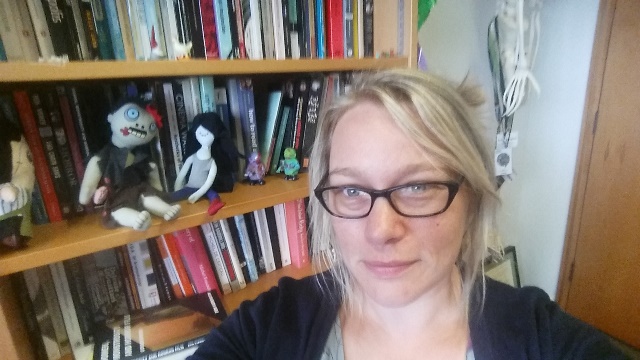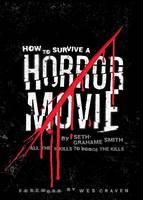Dr. Erin Harrington is a researcher and lecturer at the University of Canterbury. Her area of expertise? Monsters, murderers and all things sinister and unsettling - or more specifically, the horror genre.
Harrington is giving a free talk at the university next week on just this topic. Being something of a horror enthusiast myself I was keen to pick her brains (not literally), about why people are drawn to movies and stories that, superficially at least, should make us run a mile.
What is it about horror that appeals to you particularly, as opposed to other genres?
I ask myself this every day! I have always liked horror – I have fond memories of going to the Haunted Mansion at Disneyland when I was 6 years old – so there’s something fundamental about the way that scary stories are able to communicate with us that really appeals to me, just as other people might respond to fantasy or westerns. I think I always liked how evocative and transgressive horror can be. It’s a place where boundaries can be pushed, and where we can think through big or challenging ideas, or explore frightening things in a secure space, much in the way that slumber party ghost stories can be both thrilling and safe. There’s a visceral pleasure to horror, as it can range from the horrifying or thrilling to the hilarious or gross. I also think I just like monsters a lot.
Does studying horror academically make it more difficult to enjoy as pure entertainment?
It can do. It’s harder to switch off, as you become really aware of the cinematic language that they are using, and a lot of films are quite derivative, but the best films will draw you in no matter what. Sometimes watching films can feel a bit like homework, which is frustrating. Weirdly, it has made me appreciate average or even quite bad films a bit more, as I can kinda see what they are trying to do, or how they connect to other films within the genre and subgenres, even if they fail spectacularly. Perhaps it’s like being an expert cheese taster – you eat enough of the stuff that you come away with an affection for even the stinkiest gloop.
I love horror but my partner does not. Which one of us is right? Or rather, why is it that some people love to be scared but others loathe it?
You are both right (sorry). We all have different tastes in terms of the sorts of stories we respond to, and this will include how those stories are told – their imagery, the way they sound, their pace and so on. Not all horror films are graphic, but people definitely have varying levels of tolerance for images of fictional violence. Additionally, all film plays with our emotions, but some make us have a more physical reaction than others – comedies make us laugh (hopefully), emotional films might make us feel sentimental or sad, and so on. The emotions and sensations that come up with horror can be quite complex, and some people are just more comfortable with uncertainty or ambiguous feelings. Fear, dread, terror and horror all play with a shift between tension and release that some people find more interesting and stimulating than others. For example, I get really frustrated with films that have a lot of jump scares, as I don’t like being startled, but I find films that are unsettling or disturbing, or that have provocative imagery, or that retell familiar stories in new ways both rewarding and challenging. Some of us just like stories about monsters.
What should horror-fans (or the horror-curious) expect from your free talk at University of Canterbury?
I’m going to talk about some of the reasons people get pleasure or satisfaction from horror, but I’ll also look at the unique ways that horror can tell stories. I hope this helps the horror-phobic better understand why they may not respond to these films well, and prompts horror lovers to think about their own reactions to films. Whether people are horror newbies or experts, I want them to come away with an appreciation for how broad and diverse the genre is, but also but also how entertaining it can be. A lot of horror is really funny, and I reckon there’s a horror film for everyone.
Which movies or books would you recommend for those wanting to indulge in some horror research of their own?
How to Survive a Horror Movie is a really fun guide to horror tropes, and it looks at a lot of the most notable horror films from the last few decades. It can be really helpful to understand how horror films have changed over time, how they’ve reflected their own era’s fears and anxieties, and how they have influenced later films. Horror Films of the 1990s and Shock Value both do a good job of exploring context while highlighting significant films and shifts in tastes and subgenres.
Oscar-nominated film Get Out is one of the best horror movies in years, and easily one of the best films of 2017 full stop. It’s a great gateway film for the horror-phobic. If you’re after some international horror, then moody Iranian supernatural horror Under the Shadow, Norwegian horror comedy Dead Snow and action-packed South Korean zombie film Train to Busan are all pretty nifty.
It’s not in the library catalogue, but Stephen King’s 1981 non-fiction book Danse Macabre is still one of the best books out on the history of literary horror, even though it’s close to 40 years old.
Anything else you want to say about anything horror-related?
Monsters can be your friends too!
Find out more (if you dare!)
- Horror for the faint-hearted, 7pm, Wednesday 7 March at University of Canterbury
- Read Erin Harrington's book, Women, monstrosity and horror film: Gynaehorror
- A frightful buffet: ten (plus one) horror films Erin Harrington's playlist of horror films on Kanopy
- Find Horror Films in the library catalogue






Add a comment to: The doctor (of horror) is in